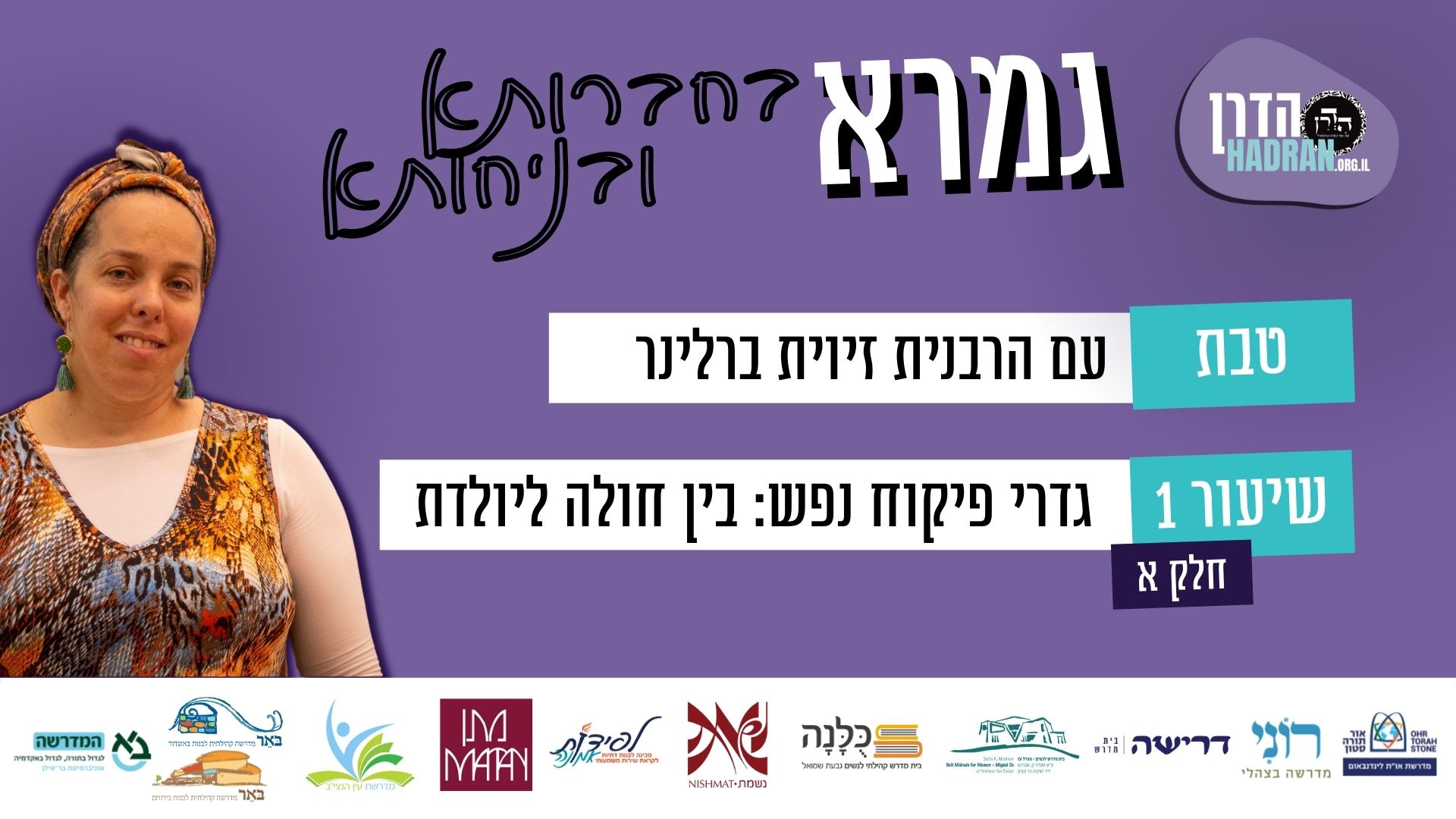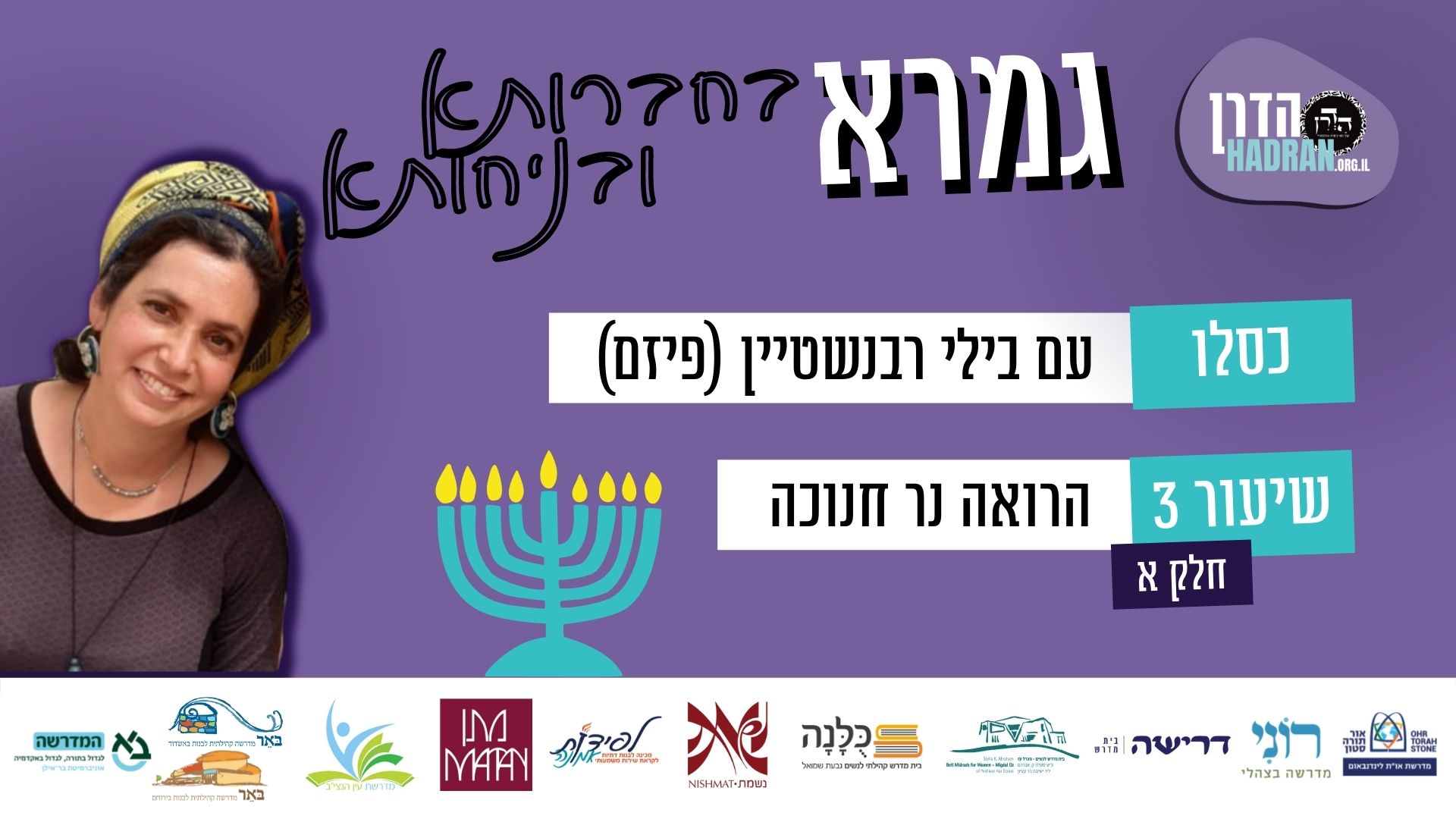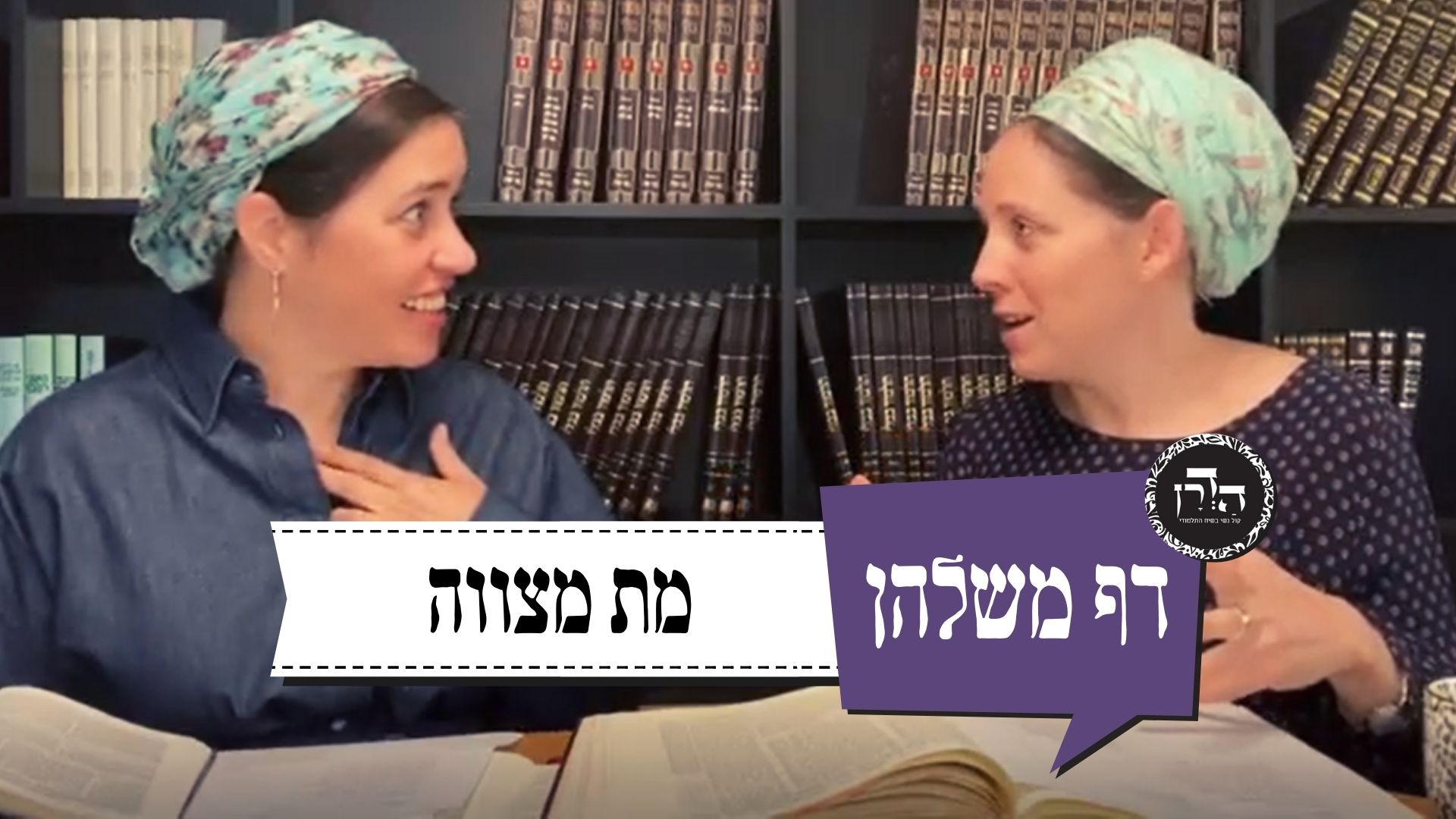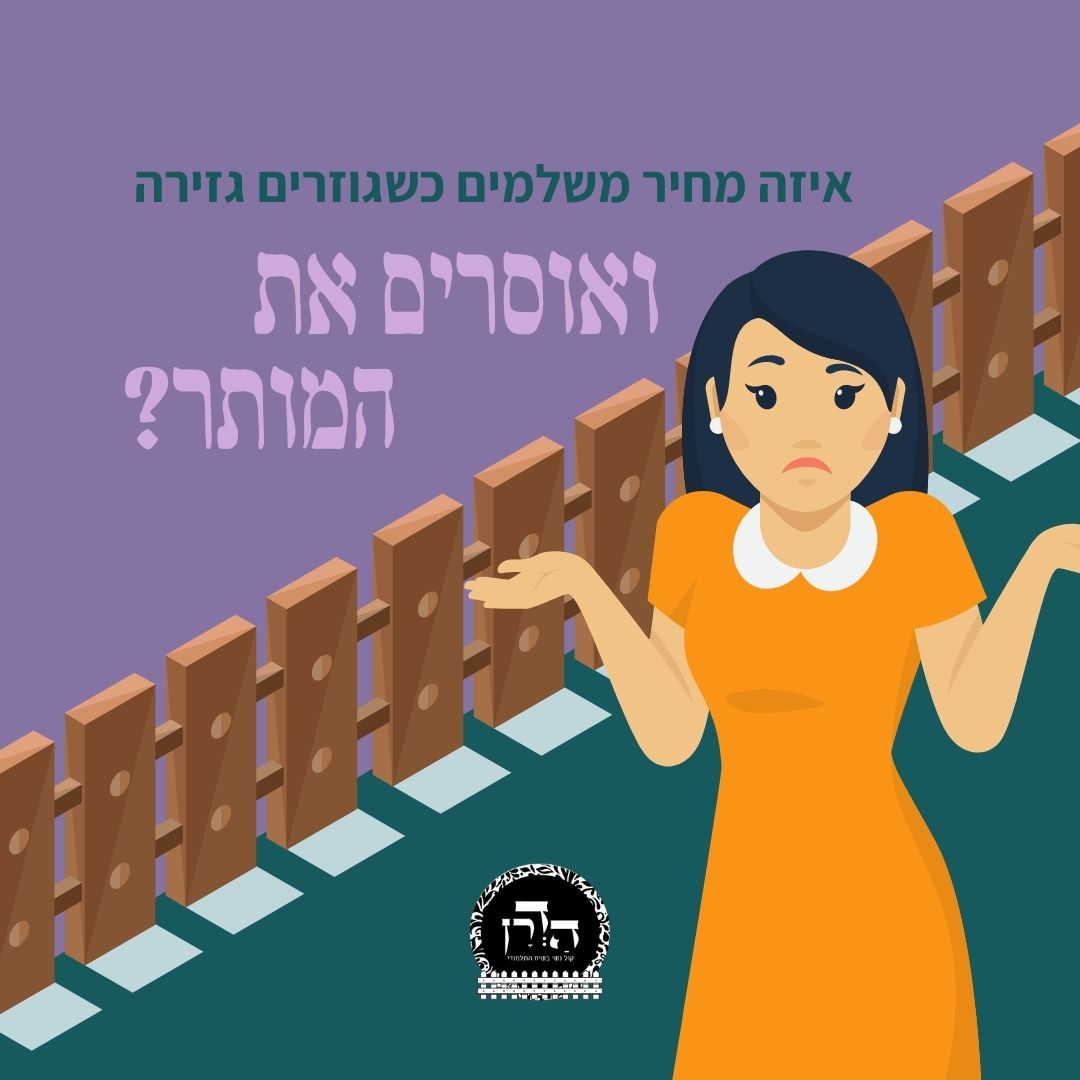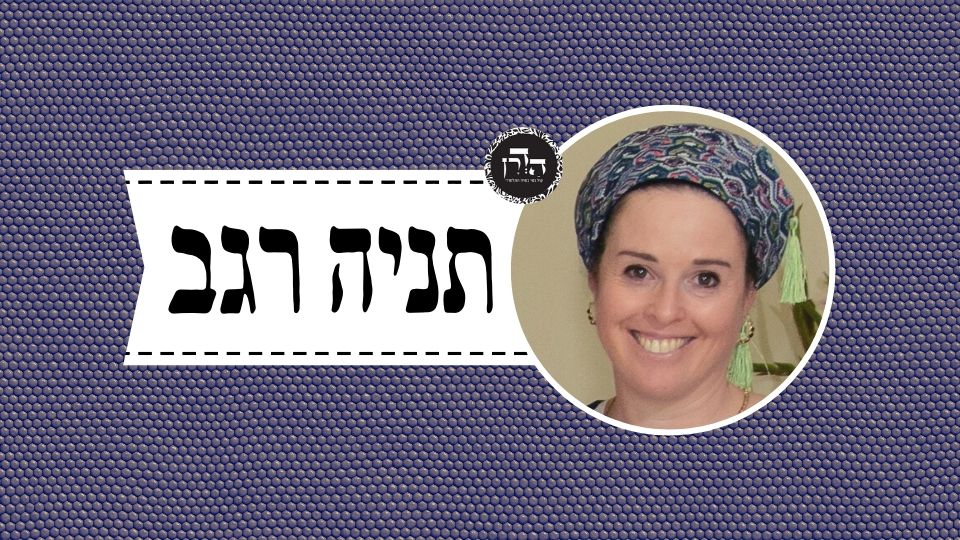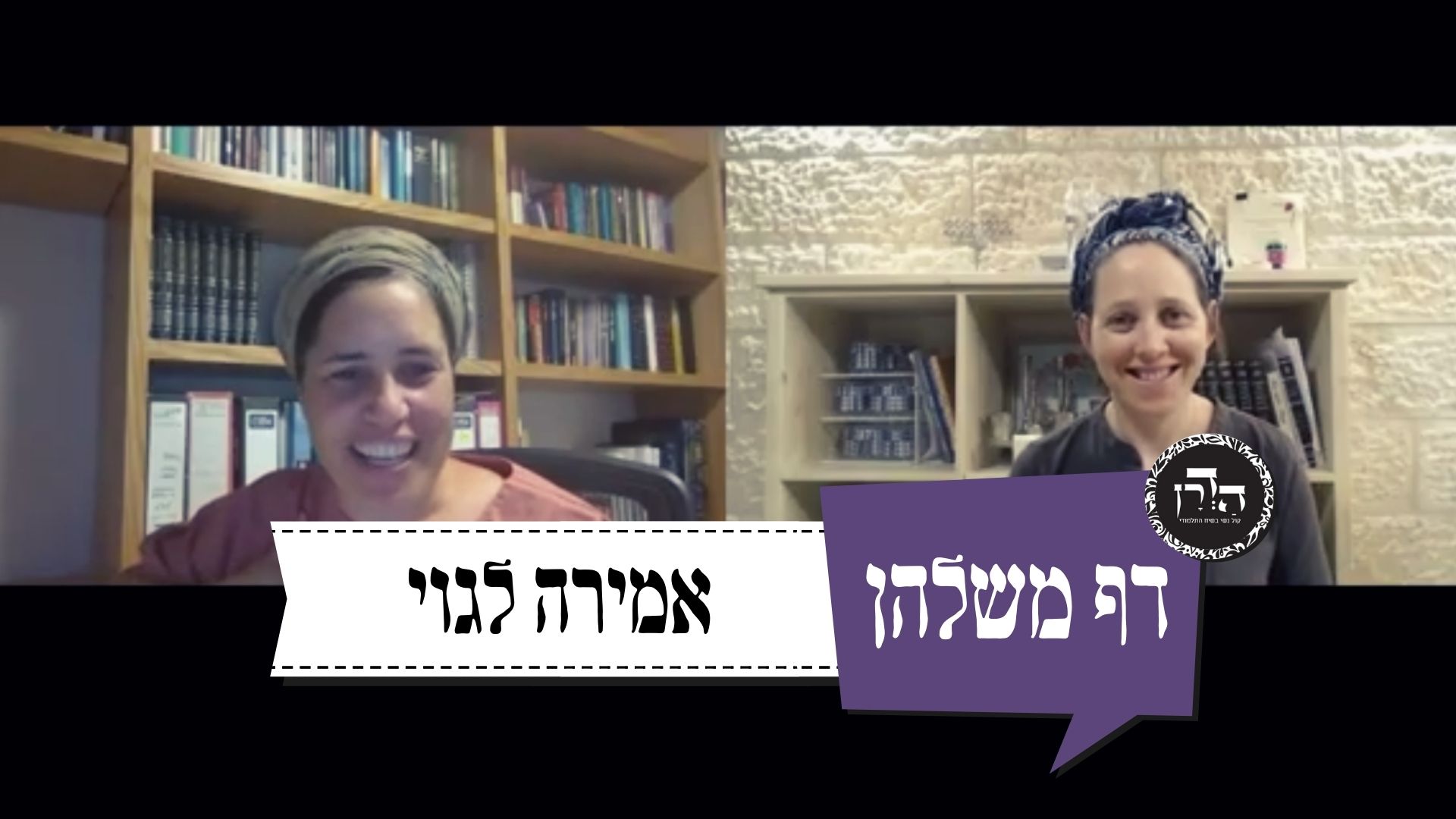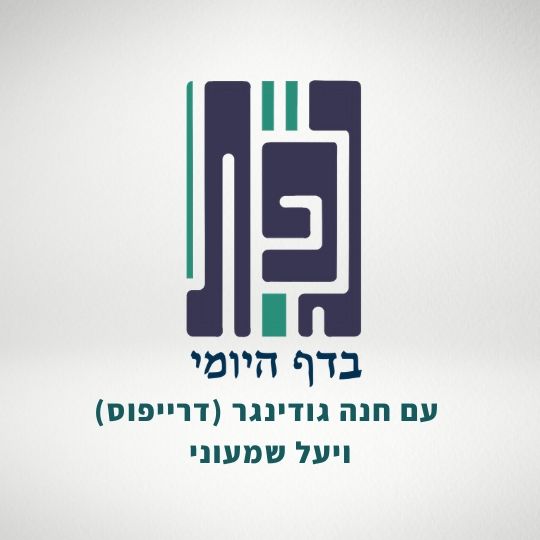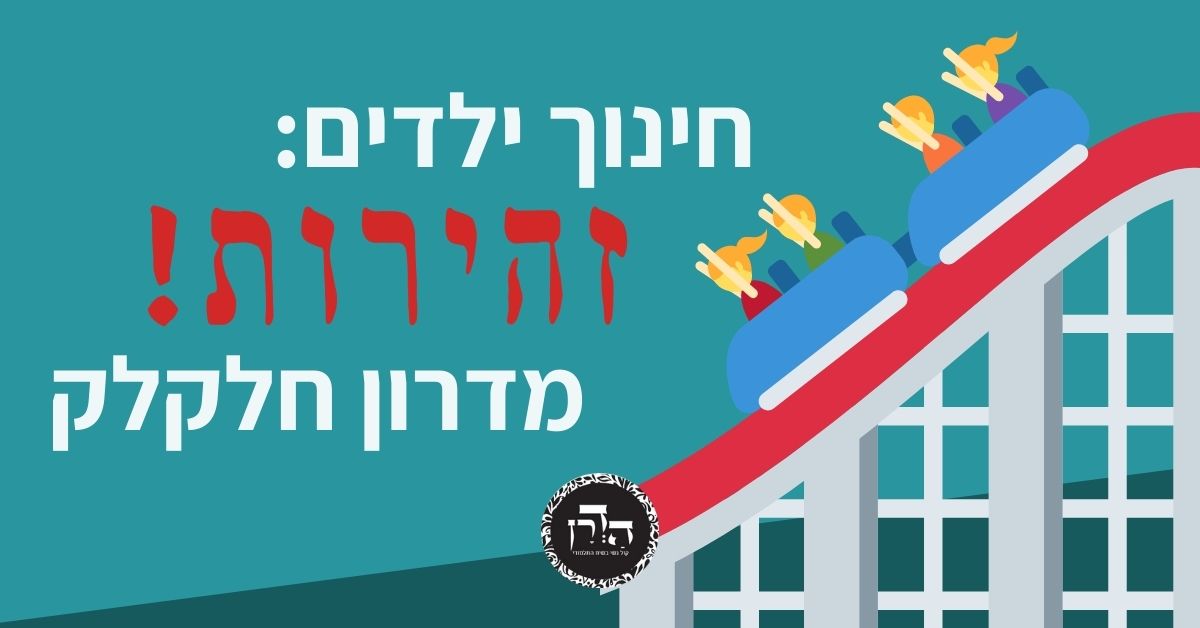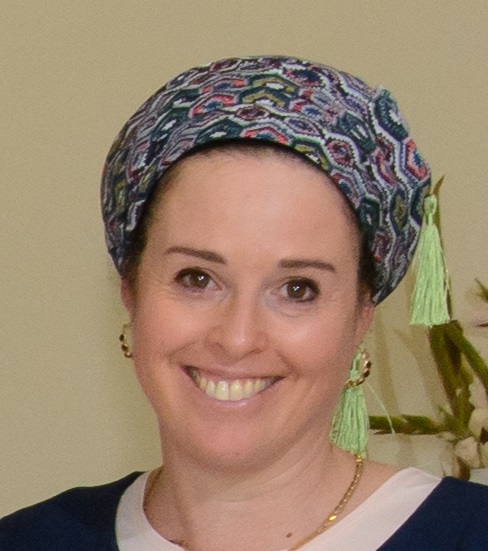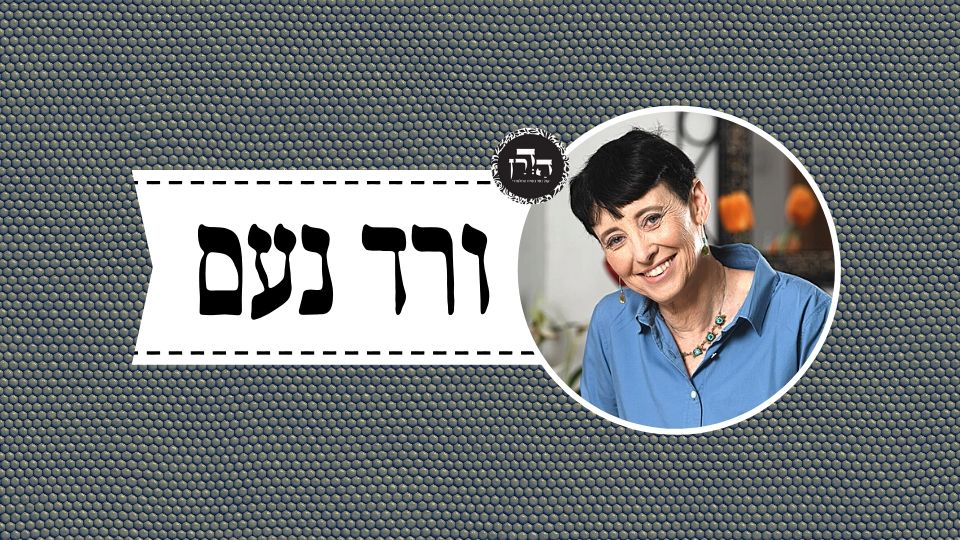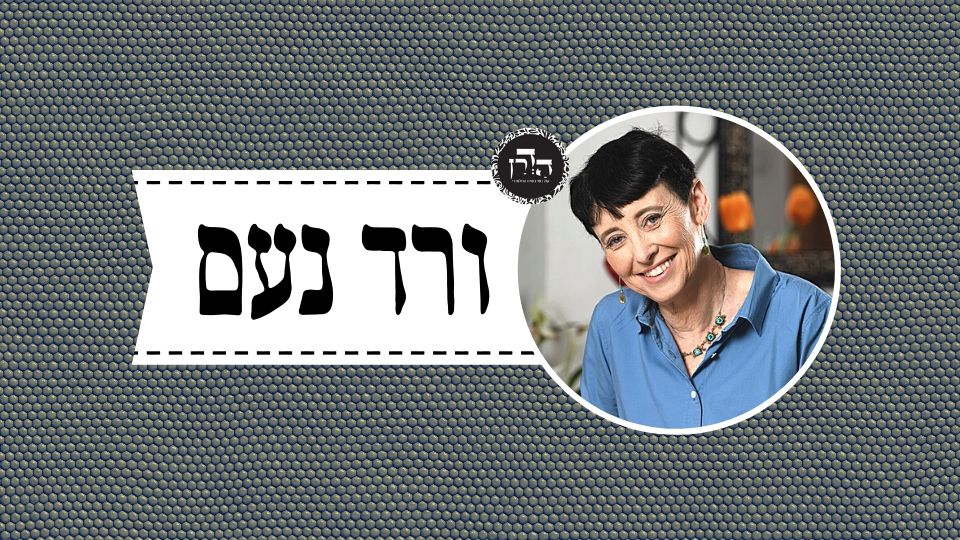האם בזמן החרבן באמת לא נשארו אנשים שלא דיברו שקר? מה מותר להציל מבחינת אוכל בסלים או בגדים משריפה? איך מצלין את הבגדים? לגבי הסלים – באיזה מקרה זה אפשרי ובאיזה לא? איך זה שונה המהמשנה הקודמת ששם רק התירו שלוש סעודות? איך אחרים יכולים לעזור לו? האם גרם כיבוי (לכבות שריפה בעקיפין) אסור או מותר בשבת? יש מחלוקת במשנה. הגמרא מביאה כמה מקורות שבהם נראה שהשיטות הן הפוכות אבל הגמרא פותרת את הסתירות.

כלים
הלימוד החודש מוקדש לרפואת פיליס הכט, גיטל פעשא בת מאשה רחל על ידי חברותיה הרבות שאוהבות ומעריכות אותה.
כלים
העמקה
רוצה להבין מה באמת קורה מתחת לפני השטח של הסוגיה?
שיעורים, פודקאסטים והרחבות של מיטב המורות שלנו יפתחו לך עוד זוויות וכיווני חשיבה.
חדשה בלימוד הגמרא?
זה הדף הראשון שלך? איזו התרגשות עצומה! יש לנו בדיוק את התכנים והכלים שיעזרו לך לעשות את הצעדים הראשונים ללמידה בקצב וברמה שלך, כך תוכלי להרגיש בנוח גם בתוך הסוגיות המורכבות ומאתגרות.
פסיפס הלומדות שלנו
גלי את קהילת הלומדות שלנו, מגוון נשים, רקעים וסיפורים. כולן חלק מתנועה ומסע מרגש ועוצמתי.
שבת קכ
דְּבָרִים שֶׁאֵין בְּנֵי אָדָם עוֹמְדִין עֲלֵיהֶם אֶלָּא אִם כֵּן נִכְשָׁלִים בָּהֶן יֶשְׁנָן תַּחַת יָדֶיךָ, ״קָצִין תִּהְיֶה לָנוּ״. ״יִשָּׂא בַיּוֹם הַהוּא לֵאמֹר לֹא אֶהְיֶה חוֹבֵשׁ וְגוֹ׳״ — אֵין יִשָּׂא אֶלָּא לְשׁוֹן שְׁבוּעָה, וְכֵן הוּא אוֹמֵר ״לֹא תִשָּׂא אֶת שֵׁם ה׳״. ״לֹא אֶהְיֶה חוֹבֵשׁ״ — לֹא אֶהְיֶה מֵחוֹבְשֵׁי עַצְמָן בְּבֵית הַמִּדְרָשׁ. ״וּבְבֵיתִי אֵין לֶחֶם וְאֵין שִׂמְלָה״ — שֶׁאֵין בְּיָדִי לֹא מִקְרָא וְלֹא מִשְׁנָה וְלֹא גְּמָרָא. וּמִמַּאי? דִּילְמָא שָׁאנֵי הָתָם, דְּאִי אֲמַר לְהוּ גְּמִירְנָא, אֲמַרוּ לֵיהּ: אֵימָא לַן. הֲוָה לֵיהּ לְמֵימַר גְּמַר וּשְׁכַח, מַאי ״לֹא אֶהְיֶה חוֹבֵשׁ״? — כְּלָל! לָא קַשְׁיָא: כָּאן בְּדִבְרֵי תוֹרָה, כָּאן בְּמַשָּׂא וּמַתָּן.
Matters of Torah that people do not ascertain unless they misunderstand them are in your hands; therefore, be a chief over us. It is stated later on in that passage: “He will rise [yissa] on that day, saying, I will not be a ruler while in my house there is no bread and no garment, you shall not appoint me as chief of the people” (Isaiah 3:7). The term rise [yissa] means nothing other than an oath, as it says: “Do not raise [tissa] the name of the Lord your God in vain” (Exodus 20:17). I will not be a ruler, means: I will not be one of those who close themselves up in the study hall, as I do not regularly do so, while in my house there is no bread and no garment, for I have neither Bible nor Mishna nor Gemara in my hands. According to this explanation, there were people of faith who truthfully admitted that they did not study Torah, even during the time of the destruction of Jerusalem. The Gemara rejects this: And from what do you conclude that this admission was due to their faithfulness? Perhaps it is different in that case, as had he told them: I studied Torah, they would have said to him: Tell us what you studied. As he would not know to respond, he would have no choice other than to admit that he did not study. The Gemara rejects this: That is not difficult, as he could have at least said he learned and forgot. The Gemara asks: Therefore, what is: I will not be a ruler? It means that he is telling the truth and although he could have lied, he admits that he did not study Torah at all. The Gemara answers: This is not difficult. Here, where it was taught that they were faithful, that was with regard to matters of Torah; whereas here, where it was taught that there were no more people of faith in Jerusalem, that was with regard to matters of business.
מַתְנִי׳ מַצִּילִין סַל מָלֵא כִּכָּרוֹת, אַף עַל פִּי שֶׁיֵּשׁ בּוֹ מֵאָה סְעוּדוֹת, וְעִיגּוּל שֶׁל דְּבֵילָה, וְחָבִית שֶׁל יַיִן. וְאוֹמֵר לַאֲחֵרִים: בּוֹאוּ וְהַצִּילוּ לָכֶם. וְאִם הָיוּ פִּיקְחִין, עוֹשִׂין עִמּוֹ חֶשְׁבּוֹן אַחַר הַשַּׁבָּת.
MISHNA: One may rescue a basket full of loaves and the like from a fire on Shabbat, even if there is food for one hundred meals in it. And one may rescue a round cake of dried figs, even though it is very large, and one may rescue a barrel full of wine. And one may even say to others: Come and rescue for yourselves. And if the people who rescue with him were clever, they make a calculation with him after Shabbat in order to receive payment for the items that they rescued.
לְהֵיכָן מַצִּילִין אוֹתָן — לֶחָצֵר הַמְעוֹרֶבֶת. בֶּן בְּתִירָה אוֹמֵר: אַף לְשֶׁאֵינָהּ מְעוֹרֶבֶת. וּלְשָׁם מוֹצִיא כׇּל כְּלֵי תַּשְׁמִישׁוֹ, וְלוֹבֵשׁ כׇּל מַה שֶּׁיָּכוֹל לִלְבּוֹשׁ, וְעוֹטֵף כׇּל מַה שֶּׁיָּכוֹל לַעֲטוֹף. רַבִּי יוֹסֵי אוֹמֵר: שְׁמֹנָה עָשָׂר כֵּלִים. וְחוֹזֵר וְלוֹבֵשׁ וּמוֹצִיא, וְאוֹמֵר לַאֲחֵרִים: בּוֹאוּ וְהַצִּילוּ עִמִּי.
To where may one rescue items moved from the fire? One may do so to a courtyard where an eiruv was established, and it is permitted to carry. Ben Beteira says: One may do so even to a courtyard where an eiruv was not established. And one may carry there all the utensils, and put on all the garments that he can wear, and one may wrap all the cloths that he can wrap around himself in order to rescue his property. Rabbi Yosei says: One may put on only eighteen garments at once, as people sometimes wear that number of garments, but not more. However, one may again put on that number of garments and carry it out. And he may say to others: Come and rescue with me.
גְּמָ׳ וְהָא תְּנָא לֵיהּ רֵישָׁא שָׁלֹשׁ סְעוּדוֹת וְתוּ לָא! אָמַר רַב הוּנָא: לָא קַשְׁיָא, כָּאן — בְּבָא לְהַצִּיל, כָּאן — בְּבָא לְקַפֵּל. וּבָא לְהַצִּיל — מַצִּיל אֶת כּוּלָּן. בָּא לְקַפֵּל — אֵינוֹ מְקַפֵּל אֶלָּא מְזוֹן שָׁלֹשׁ סְעוּדוֹת. רַבִּי אַבָּא בַּר זַבְדָּא אָמַר רַב: אִידֵּי וְאִידֵּי בָּבָא לְקַפֵּל, וְלָא קַשְׁיָא: כָּאן — לְאוֹתָהּ חָצֵר, כָּאן — לְחָצֵר אַחֶרֶת. בָּעֵי רַב הוּנָא בְּרֵיהּ דְּרַב יְהוֹשֻׁעַ: פֵּירַשׂ טַלִּיתוֹ, וְקִיפֵּל וְהִנִּיחַ, וְקִיפֵּל וְהִנִּיחַ, מַאי: כְּבָא לְהַצִּיל דָּמֵי, אוֹ כְּבָא לְקַפֵּל דָּמֵי?
GEMARA: The Gemara asks: Wasn’t it taught in the first clause, i.e., the preceding mishna, that one may rescue three meals and no more? Rav Huna said: This is not difficult. This current mishna permitted rescuing a greater amount when one comes to rescue a basket or round cake of figs; that previous mishna permitted rescuing food for only three meals in a case where one comes to collect the food. When one comes to rescue, he may rescue everything; when one comes to collect, he may collect food for only three meals. However, Rabbi Abba bar Zavda said that Rav said: Both this and that are referring to a case where one comes to collect, and this is not difficult. This current mishna permitted rescuing a greater amount when one moves the objects to the same courtyard; that, the previous mishna, permitted saving food for only three meals when one transfers it to a different courtyard. Rav Huna, son of Rav Yehoshua, raised a dilemma: If one spread his cloak on the ground and collected and placed objects in the cloak, and collected and placed objects inside it, what is the ruling? Is he considered as one who comes to rescue or is he like one who comes to collect?
מִדְּאָמַר רָבָא: אַטְעֲיֵהּ רַב שֵׁיזְבִי לְרַב חִסְדָּא, וּדְרַשׁ: וּבִלְבַד שֶׁלֹּא יָבִיא כְּלִי שֶׁהוּא מַחֲזִיק יוֹתֵר מִשָּׁלֹשׁ סְעוּדוֹת, שְׁמַע מִינַּהּ כְּבָא לְהַצִּיל דָּמֵי, וְשַׁפִּיר דָּמֵי. אֲמַר לֵיהּ רַב נַחְמָן בַּר יִצְחָק לְרָבָא: מַאי טָעוּתָא? אֲמַר לֵיהּ, דְּקָתָנֵי: וּבִלְבַד שֶׁלֹּא יָבִיא כְּלִי אַחֵר וְיִקְלוֹט, כְּלִי אַחֵר וִיצָרֵף. כְּלִי אַחֵר הוּא דְּלָא, אֲבָל בְּהָהוּא מָנָא — כַּמָּה דְּבָעֵי מַצִּיל.
The Gemara attempts to resolve the dilemma from that which Rava said: Rav Sheizvi misled Rav Ḥisda, and Rav Ḥisda taught (Rabbeinu Ḥananel) a halakha with regard to a barrel that breaks on a roof, and added: And it is permitted provided that one does not bring a vessel that holds more than three meals. Conclude from the fact that Rava said that Rav Ḥisda’s restriction of the amount that can be rescued to food sufficient for three meals is mistaken, that one who takes a large amount all at once is like one who comes to rescue, and he may well do so. Rav Naḥman bar Yitzḥak said to Rava: What is the error in Rav Ḥisda’s statement? Perhaps it is actually prohibited. He said to him, as it is taught: Provided that he does not bring another vessel and place it on the ground to catch the liquid, another vessel and attach the vessel next to the roof. Apparently it is another vessel that one may not bring, but in that same vessel, one may rescue as much as he wants, and the Sages did not establish a maximum size for the vessel.
וְעִיגּוּל שֶׁל דְּבֵילָה כּוּ׳. חֶשְׁבּוֹן מַאי עֲבִידְתֵּיהּ? מֵהֶפְקֵירָא קָזָכוּ? — אָמַר רַב חִסְדָּא: מִדַּת חֲסִידוּת שָׁנוּ כָּאן. אָמַר רָבָא: חֲסִידֵי אַגְרָא דְשַׁבְּתָא שָׁקְלִי?! אֶלָּא אָמַר רָבָא: הָכָא בִּירֵא שָׁמַיִם עָסְקִינַן, וְלָא נִיחָא לֵיהּ דְּלִיתְהֲנֵי מֵאֲחֵרִים, וּבְחִנָּם נָמֵי לָא נִיחָא לֵיהּ דְּלִיטְרַח. וְהָכִי קָאָמַר: וְאִם הָיוּ פִּיקְחִין, דְּיָדְעִי דִּכְהַאי גַּוְונָא לָאו שְׂכַר שַׁבָּת הוּא, עוֹשִׂין עִמּוֹ חֶשְׁבּוֹן לְאַחַר הַשַּׁבָּת.
And we learned in the mishna that one is permitted to rescue a round cake of dried figs from a fire, and one may even say to others: Come and rescue for yourselves. And if the people who rescue with him are clever, they make a calculation with him after Shabbat. The Gemara is surprised at this: What is the mention of a calculation doing here? Aren’t they acquiring food from ownerless property? What calculation is necessary here? Whatever they rescue is theirs, and they do not need to return it to the original owner. Rav Ḥisda said: They taught an attribute of piety here. These are pious people. They want to return the objects to their owner even though they are not legally obligated to do so, and they were permitted to receive payment for their efforts. Rava said: And do pious people take payment for work they do on Shabbat? Rather, Rava said: Here, we are dealing with one who is Heaven-fearing but not completely pious. And it is uncomfortable for him to benefit from the property of others, and it is also uncomfortable for him to exert himself for free. And this is what the mishna is saying: And if they are clever and know that in a situation of this kind it is not technically payment for Shabbat labor, and it is permitted because they are only receiving a small portion of the value of the objects that they rescued, they may make a calculation with him after Shabbat.
וּלְהֵיכָן מַצִּילִין כּוּ׳. מַאי שְׁנָא הָכָא דְּקָתָנֵי ״לָכֶם״, וּמַאי שְׁנָא הָכָא דְּקָתָנֵי ״עִמִּי״? אָמְרִי: גַּבֵּי מְזוֹנוֹת קָתָנֵי ״לָכֶם״ — מִשּׁוּם דְּלָא קָא חֲזֵי אֶלָּא מְזוֹן שָׁלֹשׁ סְעוּדוֹת. אֲבָל גַּבֵּי לְבוּשִׁים קָתָנֵי ״עִמִּי״ — מִשּׁוּם דְּקָחֲזֵי לֵיהּ לְכוּלֵּי יוֹמָא.
We learned in the mishna that one may say to others: Come and rescue for yourselves. We also learned: And to where may one rescue the food? According to the first tanna, one may rescue to a courtyard in which an eiruv was established. According to ben Beteira, one may rescue even to a courtyard in which an eiruv was not established. The Gemara asks: What is different here, with regard to rescuing food, that it is taught that one may say to others: Come and rescue for yourselves, and what is different here, with regard to rescuing clothing, that it is taught that one may say to others: Come and rescue with me? The Gemara answers: With regard to food, it taught: For yourselves, because only food for three meals is suited for him, and only others can benefit from the rest. However, with regard to the garments, it is taught: With me, because it is suited for him to continue rescuing garments all day, since he is permitted to wear other clothes.
תָּנוּ רַבָּנַן: לוֹבֵשׁ מוֹצִיא וּפוֹשֵׁט, וְחוֹזֵר וְלוֹבֵשׁ וּמוֹצִיא וּפוֹשֵׁט, וַאֲפִילּוּ כׇּל הַיּוֹם כּוּלּוֹ — דִּבְרֵי רַבִּי מֵאִיר. רַבִּי יוֹסֵי אוֹמֵר: שְׁמֹנָה עָשָׂר כֵּלִים, וְאֵלּוּ הֵם שְׁמֹנָה עָשָׂר כֵּלִים: מִקְטוֹרֶן, אוּנְקְלֵי, וּפוּנְדָּא, קַלְבּוֹס שֶׁל פִּשְׁתָּן, וְחָלוּק, וְאַפִּילְיוֹן, וּמַעְפּוֹרֶת, וּשְׁנֵי סַפְרֵקִין, וּשְׁנֵי מִנְעָלִים, וּשְׁנֵי אַנְפִּילָאוֹת, וּשְׁנֵי פַּרְגּוֹד, וַחֲגוֹר שֶׁבְּמׇתְנָיו, וְכוֹבַע שֶׁבְּרֹאשׁוֹ, וְסוּדָר שֶׁבְּצַוָּארוֹ.
The Sages taught in a baraita: If one wants to rescue objects from a fire and there are many garments there, he may wear them, and take them out to a safe place, and remove them there, and return to the fire, and wear other clothes, and take them out and remove them. And he may even do so all day long; this is the statement of Rabbi Meir. Rabbi Yosei says: One may wear only eighteen garments, and these are the eighteen garments: A cloak [miktoren], a cape [unkali], a broad garment worn on one’s shoulders, and a large hollow belt worn over the clothes, a wide linen garment [kalbus], and a robe worn against the skin, a robe wrapped above, and a kerchief on one’s head, and two straps, i.e., belts, and two shoes, and two socks [anpilaot], and two tall boots [pargod], and a belt around one’s loins over the robe, and a hat on one’s head, and a scarf around one’s neck.
מַתְנִי׳ רַבִּי שִׁמְעוֹן בֶּן נַנָּס אוֹמֵר: פּוֹרְסִין עוֹר שֶׁל גְּדִי עַל גַּבֵּי שִׁידָּה תֵּיבָה וּמִגְדָּל שֶׁאָחַז בָּהֶן אֶת הָאוּר, מִפְּנֵי שֶׁהוּא מְחָרֵךְ. וְעוֹשִׂין מְחִיצָה בְּכׇל הַכֵּלִים, בֵּין מְלֵאִין בֵּין רֵיקָנִים, בִּשְׁבִיל שֶׁלֹּא תַּעֲבוֹר הַדְּלֵיקָה. רַבִּי יוֹסֵי אוֹסֵר בִּכְלֵי חֶרֶס חֲדָשִׁים מְלֵאִין מַיִם, לְפִי שֶׁאֵין יְכוֹלִין לְקַבֵּל אֶת הָאוּר וְהֵן מִתְבַּקְּעִין וּמְכַבִּין אֶת הַדְּלֵיקָה.
MISHNA: Rabbi Shimon ben Nannas says: One may spread out a moist goat’s hide over a box, a chest, or a closet that caught fire, because the fire singes and does not burn it. The fire does not burn the wet goat’s hide but merely singes it, and by doing so the wooden vessels are preserved. And one may establish a barrier against the fire with all vessels, both full and empty, so that the fire will not pass. Rabbi Yosei prohibits using new earthenware vessels full of water, because they cannot withstand the heat of the fire and they will burst and extinguish the fire, and it is prohibited to cause the fire to be extinguished on Shabbat even indirectly.
גְּמָ׳ אָמַר רַב יְהוּדָה אָמַר רַב: טַלִּית שֶׁאָחַז בָּהּ הָאוּר מִצַּד אֶחָד — נוֹתְנִין עָלֶיהָ מַיִם מִצַּד אַחֵר, וְאִם כָּבְתָה — כָּבְתָה. מֵיתִיבִי: טַלִּית שֶׁאָחַז בָּהּ הָאוּר מִצַּד אֶחָד — פּוֹשְׁטָהּ וּמִתְכַּסֶּה בָּהּ, וְאִם כָּבְתָה — כָּבְתָה. וְכֵן סֵפֶר תּוֹרָה שֶׁאָחַז בּוֹ הָאוּר — פּוֹשְׁטוֹ וְקוֹרֵא בּוֹ, וְאִם כָּבָה — כָּבָה.
GEMARA: Rav Yehuda said that Rav said: If a garment caught fire on one side, one may place water on its other side, and if as a result the fire is extinguished, it is extinguished. The Gemara raises an objection based on the following Tosefta: If a garment caught fire on one side, one may stretch it out and cover himself with it, and if the fire is extinguished, it is extinguished. And so too, if a Torah scroll caught fire, one may open it and read it, and if the fire is extinguished, it is extinguished. Apparently, it is prohibited to actually pour water, but one may perform a permitted act that will incidentally extinguish.
הוּא דְּאָמַר כְּרַבִּי שִׁמְעוֹן בֶּן נַנָּס.
The Gemara answers: It was Rav who said his statement in accordance with the opinion of Rabbi Shimon ben Nannas in the mishna.
אֵימַר דְּאָמַר רַבִּי שִׁמְעוֹן בֶּן נַנָּס ״מִפְּנֵי שֶׁהוּא מְחָרֵךְ״, גְּרַם כִּיבּוּי מִי אָמַר? אִין, מִדְּקָתָנֵי סֵיפָא רַבִּי יוֹסֵי אוֹסֵר בִּכְלֵי חֶרֶס חֲדָשִׁים מְלֵאִים מַיִם, שֶׁאֵינָן יְכוֹלִים לְקַבֵּל אֶת הָאוּר וְהֵן מִתְבַּקְּעִין וּמְכַבִּין אֶת הַדְּלֵיקָה — מִכְּלָל דְּתַנָּא קַמָּא שָׁרֵי.
The Gemara asks: Say that Rabbi Shimon ben Nannas said it is permitted to place the goat’s hide on the burning item because it singes and does not burn; did he say it is permitted to indirectly cause the fire to extinguish? The Gemara answers: Yes, Rabbi Shimon ben Nannas permitted that as well, and we learn this from that which is taught in the latter clause in the mishna: Rabbi Yosei prohibits using new earthenware vessels that are full of water, because they cannot withstand the fire and will burst and extinguish the fire. This proves by inference that the first tanna, Rabbi Shimon ben Nannas, permits it.
תָּנוּ רַבָּנַן: נֵר שֶׁעַל גַּבֵּי טַבְלָא — מְנַעֵר אֶת הַטַּבְלָא וְהִיא נוֹפֶלֶת, וְאִם כָּבְתָה — כָּבְתָה. אָמְרִי דְּבֵי רַבִּי יַנַּאי: לֹא שָׁנוּ אֶלָּא בְּשׁוֹכֵחַ, אֲבָל בְּמַנִּיחַ — נַעֲשָׂה בָּסִיס לְדָבָר הָאָסוּר.
The Sages taught: With regard to a candle that is atop a board, one shakes the board and the candle falls, and if it is extinguished, it is extinguished. The Sages of the school of Rabbi Yannai said: They only taught that this is permitted in a case where one forgets the candle atop the board when Shabbat began. However, in a case where one places it there, the board becomes a base for a prohibited object and may not be moved.
תָּנָא: נֵר שֶׁאֲחוֹרֵי הַדֶּלֶת — פּוֹתֵחַ וְנוֹעֵל כְּדַרְכּוֹ, וְאִם כָּבְתָה — כָּבְתָה. לָיֵיט עֲלַהּ רַב. אֲמַר לֵיהּ רָבִינָא לְרַב אַחָא בְּרֵיהּ דְּרָבָא, וְאָמְרִי לַהּ רַב אַחָא בְּרֵיהּ דְּרָבָא לְרַב אָשֵׁי: מַאי טַעְמָא לָיֵיט עֲלַהּ רַב? אִילֵּימָא מִשּׁוּם דְּרַב סָבַר לַהּ כְּרַבִּי יְהוּדָה, וְתָנָא קָתָנֵי לַהּ כְּרַבִּי שִׁמְעוֹן. מִשּׁוּם דְּרַב סָבַר לַהּ כְּרַבִּי יְהוּדָה, כׇּל דְּתָנֵי כְּרַבִּי שִׁמְעוֹן מֵילָט לָיֵיט לֵיהּ?!
It was taught: With regard to a candle behind a door, one may open and shut the door in his usual manner, and if it is extinguished, it is extinguished. Rav would curse one who did so. Ravina said to Rav Aḥa, son of Rava, and some say that Rav Aḥa, son of Rava, said to Rav Ashi: What is the reason that Rav cursed and reprimanded one who did so? If you say it is because Rav holds in accordance with the opinion of Rabbi Yehuda that it is prohibited to perform an unintentional act from which a prohibited labor could ensue, and the tanna taught in accordance with the opinion of Rabbi Shimon that it is permitted to perform an unintentional act in those circumstances; because Rav holds in accordance with the opinion of Rabbi Yehuda, he curses anyone who teaches the halakha in accordance with the opinion of Rabbi Shimon? They rely on the ruling of a tanna, whose opinion is legitimate.
אֲמַר לֵיהּ: בְּהָא אֲפִילּוּ רַבִּי שִׁמְעוֹן מוֹדֶה. דְּהָא אַבָּיֵי וְרָבָא דְּאָמְרִי תַּרְוַיְיהוּ: מוֹדֶה רַבִּי שִׁמְעוֹן בִּ״פְסִיק רֵישֵׁיהּ וְלָא יְמוּת״.
He said to him: In this case, even Rabbi Shimon concedes that it is prohibited, as it was Abaye and Rava who both said that Rabbi Shimon concedes in a case of: Cut off its head, will it not die? In an instance where the unintentional act leads to an inevitable prohibited consequence, even Rabbi Shimon agrees that the person who performs the unintentional act is liable.
אָמַר רַב יְהוּדָה: פּוֹתֵחַ אָדָם דֶּלֶת כְּנֶגֶד מְדוּרָה בְּשַׁבָּת. לָיֵיט עֲלַהּ אַבָּיֵי. בְּמַאי עָסְקִינַן? אִילֵימָא בְּרוּחַ מְצוּיָה — מַאי טַעְמֵיהּ דְמַאן דְּאָסַר?! אִי בְּרוּחַ שֶׁאֵינָהּ מְצוּיָה — מַאי טַעְמָא דְמַאן דְּשָׁרֵי?! לְעוֹלָם בְּרוּחַ מְצוּיָה: מָר סָבַר גָּזְרִינַן, וּמָר סָבַר לָא גָּזְרִינַן.
Rav Yehuda said: A person opens a door opposite a fire on Shabbat. The Gemara relates that Abaye would curse anyone who did so. The Gemara clarifies: With what are we dealing? If you say this is referring to a case where a typical wind is blowing outside, what is the reason of the one who prohibits opening the door? A typical wind will neither fan nor extinguish the fire. And if it is referring to a case where an atypical wind is blowing outside, what is the reason of the one who permits opening the door? The Gemara answers: Actually, it is referring to the case of a typical wind. However, one Sage, Abaye, holds that we issue a decree prohibiting to open the door in the case of a typical wind due to a case of an atypical wind, and the other Sage, Rav Yehuda, holds that we do not issue that decree.
עוֹשִׂין מְחִיצָה כּוּ׳. לְמֵימְרָא דְּרַבָּנַן סָבְרִי גְּרַם כִּבּוּי מוּתָּר, וְרַבִּי יוֹסֵי סָבַר גְּרַם כִּבּוּי אָסוּר? וְהָא אִיפְּכָא שָׁמְעִינַן לְהוּ. דְּתַנְיָא: עוֹשִׂין מְחִיצָה בְּכֵלִים רֵיקָנִין, וּבִמְלֵאִין שֶׁאֵין דַּרְכָּן לְהִשְׁתַּבֵּר. וְאֵלּוּ מְלֵאִין שֶׁאֵין דַּרְכָּן לְהִשְׁתַּבֵּר — כְּלֵי מַתָּכוֹת. רַבִּי יוֹסֵי אוֹמֵר: אַף כְּלֵי כְּפַר שִׁיחִין וּכְלֵי כְּפַר חֲנַנְיָה אֵין דַּרְכָּן לְהִשְׁתַּבֵּר. וְכִי תֵּימָא: אֵיפוֹךְ מַתְנִיתִין, וְרַבִּי יוֹסֵי דְּבָרַיְיתָא לְדִבְרֵיהֶם קָאָמַר. וּמִי מָצֵית אָפְכַתְּ לַהּ? וְהָאָמַר רַבָּה בַּר תַּחְלִיפָא מִשְּׁמֵיהּ דְּרַב: מַאן תָּנָא גְּרַם כִּבּוּי אָסוּר — רַבִּי יוֹסֵי!
We learned in the mishna that one may establish a barrier with all earthenware vessels, and Rabbi Yosei prohibits using new earthenware vessels. The Gemara asks: Is that to say that the Rabbis hold that indirect extinguishing is permitted on Shabbat, and Rabbi Yosei holds that indirect extinguishing is prohibited? Didn’t we hear them state the opposite, as it was taught in a baraita: One may establish a barrier with empty vessels, and with full ones that do not typically break. And these are full vessels that do not typically break; metal vessels. Rabbi Yosei says: Even earthenware vessels from the village of Shiḥin and vessels from the village of Ḥananya do not typically break. Apparently, Rabbi Yosei’s opinion is more lenient than the opinions of the Rabbis. And if you say: Reverse the attribution of opinions in the mishna and attribute Rabbi Yosei’s opinion to the Rabbis, and say that Rabbi Yosei is saying his statement in the baraita in accordance with the opinion of the Rabbis, although he himself disagrees and permits using all vessels. But can you reverse the mishna? Didn’t Rabba bar Taḥalifa say in the name of Rav: Who is the tanna who teaches that indirect extinguishing is prohibited? It is Rabbi Yosei.
אֶלָּא לְעוֹלָם לָא תֵּיפוֹךְ, וּבָרָיְיתָא כּוּלָּהּ רַבִּי יוֹסֵי הִיא. וְחַסּוֹרֵי מְחַסְּרָא וְהָכִי קָתָנֵי: עוֹשִׂין מְחִיצָה בְּכֵלִים רֵיקָנִין וּבִמְלֵאִים שֶׁאֵין דַּרְכָּן לְהִשְׁתַּבֵּר. וְאֵלּוּ הֵן כֵּלִים שֶׁאֵין דַּרְכָּן לְהִשְׁתַּבֵּר: כְּלֵי מַתָּכוֹת. וּכְלֵי כְּפַר שִׁיחִין וּכְלֵי כְּפַר חֲנַנְיָה נָמֵי אֵין דַּרְכָּן לְהִשְׁתַּבֵּר, שֶׁרַבִּי יוֹסֵי אוֹמֵר: אַף כְּלִי כְּפַר שִׁיחִין וּכְלֵי כְּפַר חֲנַנְיָה אֵין דַּרְכָּן לְהִשְׁתַּבֵּר.
Rather, actually, do not reverse the attribution of the opinions in the mishna, and the entire baraita is in accordance with the opinion of Rabbi Yosei, and it is incomplete and is teaching the following: One may establish a barrier with empty vessels and full ones that do not typically break. And these are vessels that do not typically break: Metal vessels; and vessels from the village of Shiḥin and vessels from the village of Ḥananya also do not typically break, as Rabbi Yosei says: Even vessels from the village of Shiḥin and vessels from the village of Ḥananya do not typically break.
וְרָמֵי דְּרַבָּנַן אַדְּרַבָּנַן, וְרָמֵי דְּרַבִּי יוֹסֵי אַדְּרַבִּי יוֹסֵי. דְּתַנְיָא: הֲרֵי שֶׁהָיָה שֵׁם כָּתוּב לוֹ עַל בְּשָׂרוֹ — הֲרֵי זֶה לֹא יִרְחוֹץ וְלֹא יָסוּךְ וְלֹא יַעֲמוֹד בִּמְקוֹם הַטִּינּוֹפֶת. נִזְדַּמְּנָה לוֹ טְבִילָה שֶׁל מִצְוָה — כּוֹרֵךְ עָלֶיהָ גֶּמִי, וְיוֹרֵד וְטוֹבֵל. רַבִּי יוֹסֵי אוֹמֵר: לְעוֹלָם יוֹרֵד וְטוֹבֵל כְּדַרְכּוֹ, וּבִלְבַד שֶׁלֹּא יְשַׁפְשֵׁף!
The conclusion is that Rabbi Yosei prohibits indirect extinguishing, and the Rabbis permit it. The Gemara raises a contradiction between one statement of the Rabbis and a second statement of the Rabbis; and it raises a contradiction between one statement of Rabbi Yosei and a second statement of Rabbi Yosei. As it was taught in a baraita: If one had a sacred name of God written on his skin he may neither wash it in water lest it be erased, nor may he smear it with oil, nor may he stand in a place of filth because it is disrespectful of God’s name. If an immersion of mitzva happened to present itself, he wraps a reed over God’s name and then descends and immerses. Rabbi Yosei says: Actually, he descends and immerses in his usual manner, even if it is not an immersion of mitzva, provided that he does not rub the spot and erase the name. Apparently, Rabbi Yosei’s opinion is more lenient than that of the Sages with regard to indirectly causing a prohibited outcome.
שָׁאנֵי הָתָם דְּאָמַר קְרָא: ״וְאִבַּדְתֶּם אֶת שְׁמָם מִן הַמָּקוֹם הַהוּא לֹא תַעֲשׂוּן כֵּן לַה׳ אֱלֹהֵיכֶם״ — עֲשִׂיָּיה הוּא דְּאָסוּר, גְּרָמָא שְׁרֵי.
The Gemara answers: It is different there because the verse says: “And you shall break down their altars, and you shall smash their pillars, and their sacred trees, and burn with fire, and the graven images of their gods you shall hew down and you shall destroy their name from that place. You shall not do so to the Lord your God” (Deuteronomy 12:3–4). From the prohibition: “You shall not do so,” Rabbi Yosei derives that actually doing so is that which is prohibited; indirectly causing that result is permitted.
אִי הָכִי, הָכָא נָמֵי, כְּתִיב: ״לֹא תַעֲשֶׂה [כׇל] מְלָאכָה״ — עֲשִׂיָּיה הוּא דְּאָסוּר, גְּרָמָא שְׁרֵי! מִתּוֹךְ שֶׁאָדָם בָּהוּל עַל מָמוֹנוֹ, אִי שָׁרֵית לֵיהּ — אָתֵי לְכַבּוֹיֵי.
The Gemara asks: If so, here too, with regard to Shabbat, it is written: “And the seventh day is Shabbat for the Lord your God, you shall not perform any labor” (Exodus 20:9). And here, too, one could derive: Performance is that which is prohibited; indirectly causing a prohibited action is permitted. The Gemara answers: Actually, Rabbi Yosei maintains there is no prohibition in indirectly causing a fire to be extinguished; however, since a person is agitated about his property, if you permit him to indirectly extinguish the fire, he will come to extinguish it directly.
אִי הָכִי קַשְׁיָא דְּרַבָּנַן אַדְּרַבָּנַן: וּמָה הָתָם דְּאָדָם בָּהוּל עַל מָמוֹנוֹ — שְׁרֵי, הָכָא לֹא כׇּל שֶׁכֵּן?!
The Gemara asks: If so, there is a contradiction between one statement of the Rabbis and another statement of the Rabbis: If in the case of a fire, where a person is agitated about his property, nevertheless, the Rabbis hold that indirect extinguishing is permitted; here, in the case of erasing God’s name, all the more so it should be permitted to indirectly cause erasure of God’s name. Why did the Rabbis in the baraita issue a stringent ruling in this matter?
וְתִסְבְּרָא הַאי גֶּמִי הֵיכִי דָּמֵי? אִי דְּמִיהַדַּק — קָא הָוֵי חֲצִיצָה, אִי לָא מִיהַדַּק — עָיְילִי בֵּיהּ מַיָּא! חֲצִיצָה, תִּיפּוֹק לֵיהּ מִשּׁוּם דְּיוֹ! בְּלַחָה. דְּתַנְיָא: הַדָּם וְהַדְּיוֹ הַדְּבַשׁ וְהֶחָלָב, יְבֵשִׁין — חוֹצְצִין, לַחִים — אֵין חוֹצְצִין. מִכׇּל מָקוֹם קַשְׁיָא?
The Gemara rejects this: And how can you understand it that way? What are the circumstances of this reed with which God’s name is covered while immersing according to the Rabbis? If it is firmly attached, it is an interposition; if it is not firmly attached, the water enters and erases the name. The Gemara questions this: If the concern is with regard to an interposition, derive that it is an interposition in any case due to the ink on his skin. The Gemara answers: This is referring to moist ink that does not interpose, as it was taught in a baraita: With regard to blood, and ink, and honey, and milk on a person’s skin, when they are dry, they interpose during immersion; when they are moist, they do not interpose. The Gemara continues: Nevertheless, it is difficult: Why do the Rabbis require wrapping a reed around God’s name?
אֶלָּא אָמַר רָבָא בַּר רַב שֵׁילָא, הַיְינוּ טַעְמַיְיהוּ דְּרַבָּנַן, דְּקָסָבְרִי: אָסוּר לַעֲמוֹד בִּפְנֵי הַשֵּׁם עָרוֹם. מִכְּלָל דְּרַבִּי יוֹסֵי סָבַר מוּתָּר לַעֲמוֹד בִּפְנֵי הַשֵּׁם עָרוֹם? דְּמַנַּח יְדֵיהּ עִילָּוֵיהּ.
Rather, Rava bar Rav Sheila said that this is the reasoning of the Rabbis: They hold that it is prohibited for a person to stand before the name of God while naked, and therefore there must be a barrier between one’s naked body and the name. The Gemara asks: Is that to say by inference that Rabbi Yosei holds that it is permitted to stand before the name while naked? The Gemara answers: No, he does not allow doing so; however, he does not require that the name be covered with a reed. It is sufficient for one to place his hand over the name.
לְרַבָּנַן נָמֵי, דְּמַנַּח יְדֵיהּ עִילָּוֵיהּ! זִימְנִין דְּמִשְׁתְּלֵי וְשָׁקֵיל לֵיהּ. לְרַבִּי יוֹסֵי נָמֵי, זִימְנִין דְּמִשְׁתְּלֵי וְשָׁקֵיל לֵיהּ? אֶלָּא: אִי דְּאִיכָּא גֶּמִי — הָכִי נָמֵי, הָכָא בְּמַאי עָסְקִינַן — לְהַדּוֹרֵי אַגֶּמִי, רַבָּנַן סָבְרִי
The Gemara asks: If so, according to the Rabbis it should also be sufficient for one to place his hand over it. The Gemara explains: The Rabbis are concerned because sometimes one will forget and remove his hand. The Gemara asks: Shouldn’t Rabbi Yosei also be concerned because sometimes one will forget and remove his hand? Rather, if there is a reed available, Rabbi Yosei indeed concedes that one covers God’s name with it. However, with what situation are we dealing here? We are dealing with a case in which one would have to seek a reed. In that case, the Rabbis hold


